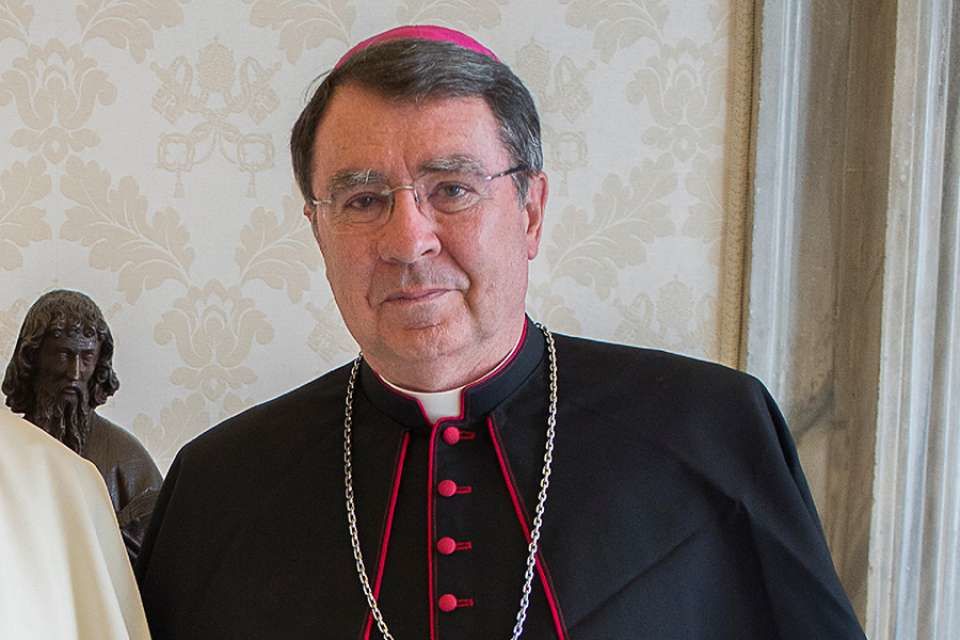Archbishop Christophe Pierre, apostolic nuncio to the US, spoke with EWTN News Nightly's Lauren Ashburn on Wednesday, discussing Pope Francis, his background, and his reception within the Church.
He mentioned the recently published work Jorge Mario Bergoglio: Una biographia intellettuale (Jorge Mario Bergoglio: An Intellectual Biography) by Massimo Borghesi, which discusses the influence on Pope Francis of Fr. Gaston Fessard, among others.
Fr. Fessard was a French philosopher of the 20th century who has been called “a penetrating critic of Marxism.” He was central to the revival of Hegelian thought on history in France, and sought to be in dialogue with Hegel, considering his widespread influence in modern philosophy. Fr. Fessard was also active in the French Resistance and a critic of the collaborationist Vichy government.
Please read excerpts from the first half of Archbishop Pierre's conversation with Ashburn, edited for clarity and length. The first half aired Dec. 14, and the second will air Dec. 15 on EWTN News Nightly.
Lauren: Archbishop Christophe Pierre, thank you so much for joining us this evening.
Archbishop Pierre: Thank you for the invitation.
Lauren: Archbishop, in the fast-moving four and a half years Pope Francis has been Pope, much has been written about him — his “option” for the poor, his evident pastoral approach, the reform of the Vatican. Now we seem to be witnessing a new phase of his interest: the intellectual and cultural roots that drive him. What are they?
Archbishop Pierre: Well, your observation is very interesting, you know, because we have to recognize that the coming of this Pope has created wonder, and a lot of questions. And if you allow me, I would say, during my one year and a half presence in this country, I’ve noticed this sense of wonder. Especially from the people themselves. They are happy to see this Pope. They feel that he is near them. They feel that he understands their problems. And I think this is one of the characteristics of the Pope. But may I say, many of us, a lot of people say, ‘Who is he? Where is he coming from?’ I would say there are two directions. One direction is coming from South America. This is his background. I’ve been living in four countries, and working in countries in South America.
(Lauren: Including Mexico) Including Mexico. And I arrived in Mexico at the time of the famous Aparecida conference of the Latin American bishops of the last century. This conference is very important to understand Pope Francis, because he was one of the main actors, because he was the Archbishop of Buenos Aires. But he was one of the main actors. So this is one aspect. The second one is intellectual background. And precisely a couple of weeks ago, an Italian author, Massimo Borghesi, published a book.
Lauren: That would be this book. (Laughter)
Archbishop Pierre: Ah, you read it.
Lauren: It’s in Italian, however, so you are going to have to tell me what it says. Let me talk to you about this book. It claims that behind this simplicity lies a “deep and original thinking,” based largely on French philosophers and theologians. That comes as a surprise to the Argentinian and populist stereotype of Francis. You are a Frenchman, who has spent years serving many different countries worldwide. What is this “deep and original thinking”?
Archbishop Pierre: Well first and foremost this Pope has been educated in our own time. The book tells us that maybe the first important author having contributed to his formation is the Jesuit Gaston Fessard. Maybe Gaston Fessard is not well known in the United States. I happened, when I was pursuing my master’s in theology in the French Catholic Institute of Paris, to make a credit on Gaston Fessard. [sic] So I was very happy when I read this book; I said, ‘My God!’
Lauren: You both are following after Gaston Fessard.
But there is unease among bishops over his approach. How can that be that be rectified?
Archbishop Pierre: I have read the Pope is not very precise. The Pope is not, eh, not a great intellectual, he is more pastoral than dogmatic. I would say these things are stereotypes. And maybe also prejudice. So I think there is a great -- we especially with the bishops -- we have a great responsibility, to try to understand our Pope. And to understand him in all aspects of his personality before making a judgment. And I think this is precisely what we should try to do. And not to remain with a superficial judgment of who he is or what he is supposed to be according to our own judgment. And by the way, he is also the Pope.
Lauren: Archbishop Christophe Pierre, thank you for joining us.
Archbishop Pierre: Thank you.

